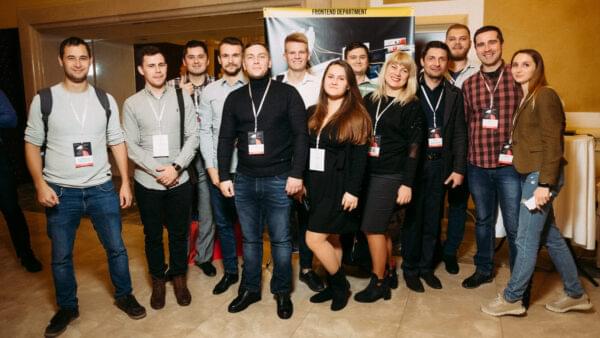IT as a lifestyle. What’s better for a frontend developer: buttons or drop-down lists?

Here is the latest material from the joint project of the Informator Tech portal and WizardsDev IT company, dedicated to the basic concepts and nuances of the internet technology market.
Choosing between radio buttons or drop-down lists may not seem like a big deal, but we have discovered that this choice makes a big difference. Don't you hate menu drop-downs when you hover your cursor over a line? You don't? Well, your son (brother, wife, husband...) just might. Often, new website visitors may change their mind about staying on a page after discovering a small flaw in the display of several elements of the site. The drop-down lists do not always work properly when you use the menu button to call them. Quite often, they just move off the screen or overlap with the text of the page. Using conventional radio buttons can solve this problem perfectly. You won't have to spend time and money to improve additional versions of the site—and that is a very good thing, you must agree. These buttons are used to select one option from the list, and this one option is preselected (and marked with an appropriate icon), so you only have to choose it or click on another one, next to it, in the offered group of options.
At WizardsDev, we ran a focus group experiment to test radio buttons and drop-down lists. Which input tools do today's users respond better to? Now, let's take a closer look at the study notes for more information about the test. Background: a large headhunting company working with clients who are looking for effective personnel. To improve the quality of its website conversion, this organization conducted an experiment.
Target: to increase significantly the total number of subscriptions (or sales).
The main question of the study: which format of customer consent parameters will provide the highest rate of conversion: radio buttons (aka switches) or drop-down menus?
In Processing 1, the research team tested user reactions to drop-down lists. A detailed analysis of user responses captured their desire to leave the web page because of the drop-down menu, as drop-down lists caused “psychological resistance to this element in the sales process.”
In Processing 2, the team hypothesized that the length of the radio buttons affects user choice, and in order to compare the response to different switch visuals, they designed some of them as close as possible to the drop-down list visuals. The closer the visual similarity was to a drop-down menu, the worse the user reaction was.
What are the actual results?
The switcher option outperformed the drop-down list with a relative difference of almost 15%. It is much easier and faster for users to click one button compared to clicking on the square first and then selecting the final option. Besides, the average quality of the Internet was taken into account. For some users, the lists did not open immediately, rather after a couple of minutes. We came to the conclusion that the use of radio buttons will increase the number of positive customer responses about the company, as well as increase the conversion rate of new visitors.
Commenting on the results of the study at a retrospective meeting of the project team, Alexander Litvinov, Head of FrontEnd at WizardsDev, said: “The reason why statistical information is so important in experimental testing is that it shows what features users like about the site. This gives you a quick sense of whether you should introduce new tools, or if it's better to leave everything as it is.”
Our team is constantly conducting various studies, each more exciting than the last, and often gets surprising results, allowing us to promptly make changes to the method and principles of development. And, of course, we actively use radio buttons in the menus. We will develop a site that can successfully attract new customers and sell business services. And highly qualified frontend specialists will advise you on all questions regarding your project. WizardsDev: IT as a lifestyle!
← The new Mobile course began in Dnepr
WizardsDev is looking for new members! →